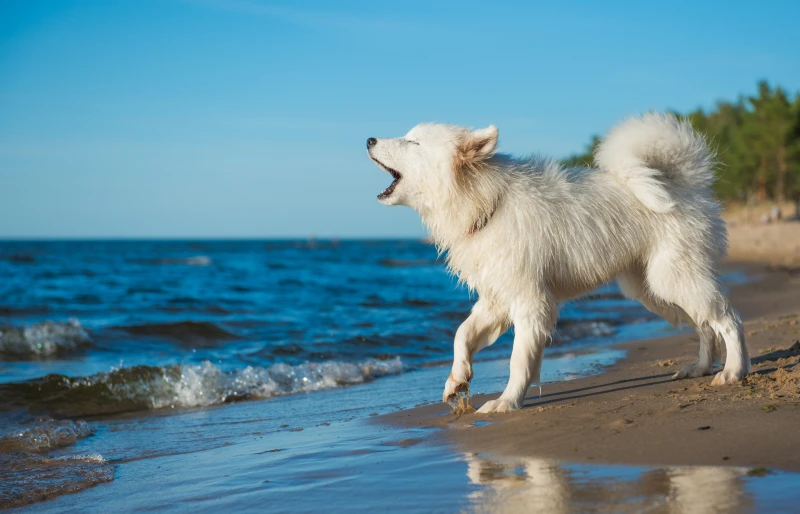Why Does My Dog Chase Cats? Vet-Reviewed Behavior Facts and Tips
Updated on
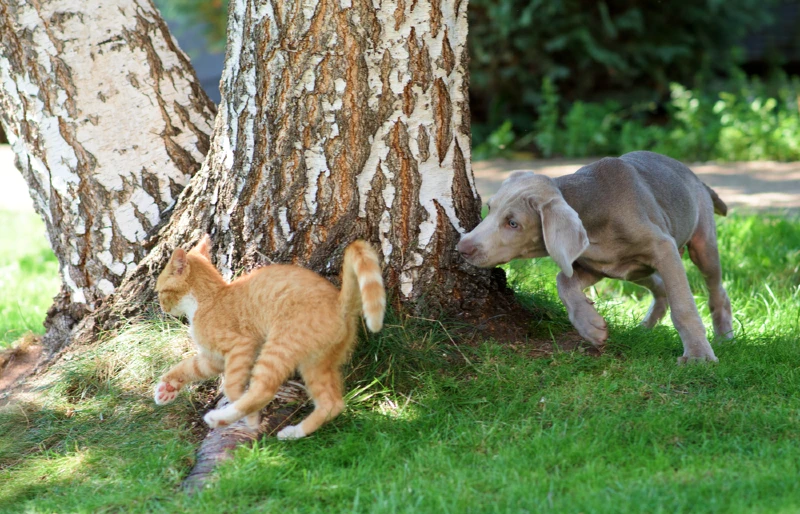
Click to Skip Ahead
From running in circles to jumping all over the place, dogs can exhibit weird behaviors that always seem to surprise us. One such behavior is their impulse to chase other animals, especially cats. If you have a dog that likes to chase felines, you’re probably wondering why they do that and how to remedy it.
Dogs will chase cats for several different reasons, though the most common one is simply instinct. Canines are natural hunters with a high prey drive, which often makes them chase all kinds of animals.
In this article, we talk more about dogs chasing cats, why such behavior occurs, and how to remedy it.
The 4 Possible Reasons That Dogs Chase Cats
1. Natural Instinct
The most common reason that a dog might chase a cat is natural instinct. Dogs are born hunters, and their hunting instinct plays an important role in their chasing behavior.
All canines have a deep desire to chase things that move, and a cat may seem like the perfect target for your furry friend.
2. Play
Although it may seem as if dogs chase cats to hurt or hunt them, not all chasing behaviors have malicious intent.
Some dogs are simply playful, especially during puppyhood, which is why they might look for a friend in a cat. In such instances, dogs chase cats as a form of entertainment. Still, you should keep in mind that not all cats will be in favor of this type of play. It could also be considered a threat, which is why the cat may hide or try to attack your canine.
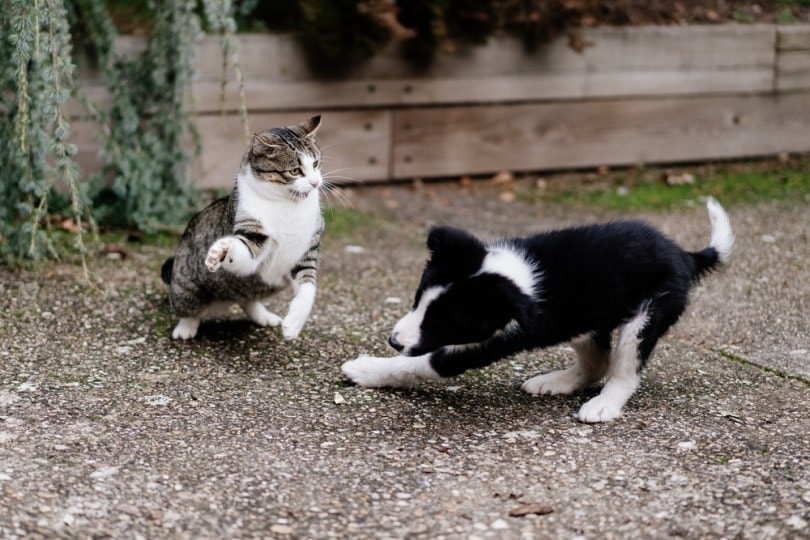
3. Breed
Although all dogs have chasing instincts, some breeds have stronger herding instincts than others, which is why they could be more prone to chasing cats. Such dog breeds include:
These dogs are more likely to chase cats as a form of herding and following their natural instincts. That said, these dogs don’t have a bad intent, and chasing is more a form of play than dominance.
4. Territorial Behavior
Many dogs exhibit territorial behaviors as part of their normal responses, certain breeds more so than others. This can include chasing anyone that invades their territory, such as cats. However, being overly territorial can be a problem for you and your dog, so it’s important to recognize and remedy such behavior.
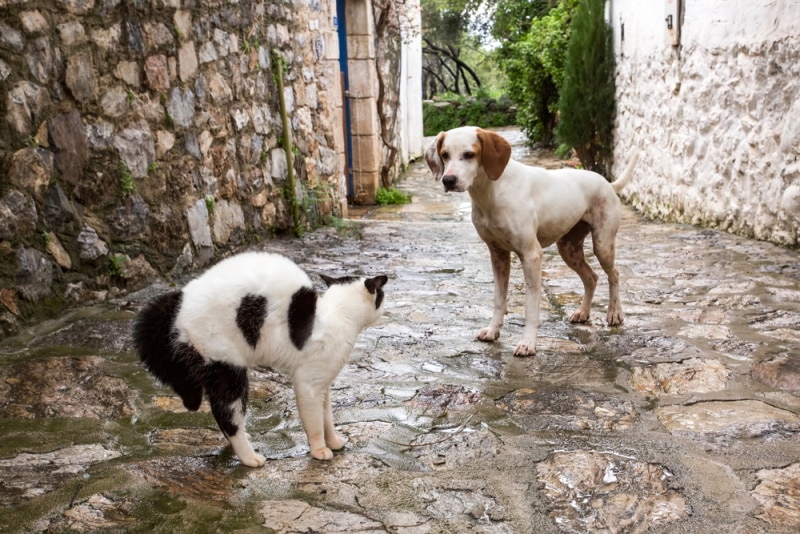
How Can You Prevent Your Dog From Chasing Cats?
1. Redirect the Behavior
One of the best ways to prevent your dog from chasing cats is to redirect the behavior through positive reinforcement. You can offer toys or create distractions that will keep them away from chasing the cat. Keep in mind that this will take time and patience.
You should be consistent and reward your dog whenever they are successfully redirected. This will encourage them to stop engaging in such behavior in the future.
2. Invest in a Clicker
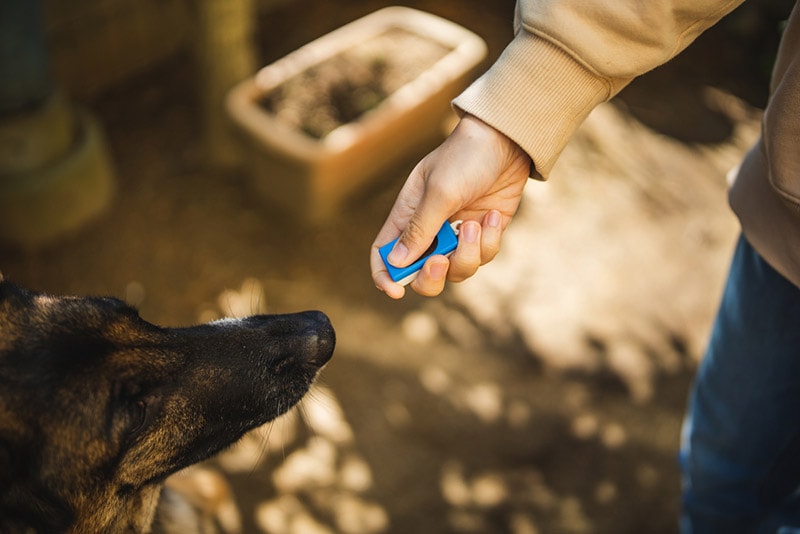
This can be an excellent tool for teaching your canine not to pay attention to cats. When properly trained, the dog will recognize the clicker sound and know to leave the cat alone.
3. Offer Other Outlets for Your Dog
Some dogs may chase felines out of boredom or due to a lack of exercise. In such cases, it’s always good to offer additional outlets that will keep your canine mentally and physically stimulated.
Dogs that are properly exercised and get enough stimulation throughout the day are less likely to get involved in chasing behaviors.
4. Use a Dog Leash or a Collar
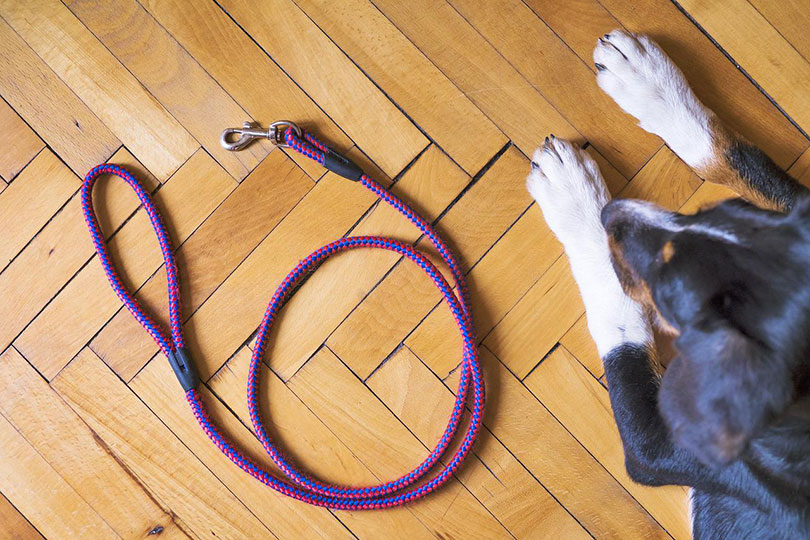
If your dog is known for exhibiting chasing behaviors and chasing cats, it’s better to be safe than sorry. When walking your dog, keep your furry companion on a leash to prevent them from running away and chasing other animals.
This method is also beneficial when introducing your dog to a new cat, as you can limit your canine’s movement.
Why Is It Important to Teach a Dog Not to Chase Cats?
Although chasing cats often comes naturally to dogs, this behavior should be prevented because it could cause severe stress and trauma for the felines being chased and injuries to your dog if the cat and the dog end up fighting. Even if there are no physical encounters and the dog doesn’t reach the cat, the whole experience can still be traumatic and negatively impact the cat’s health.
Teaching your dog not to chase cats is especially important if you are the parent of both pets. If your dog likes to chase your feline around, you should immediately stop the behavior. In such instances, the feline is likely exposed to too much stress, too often. Common signs of chronic stress in cats are:
- Changes in appetite
- Weight loss
- Diarrhea
- Excessive scratching or grooming
- Excessive vocalization
- Abnormal urination
This “game of chase” could also negatively impact your dog’s health. Dogs that like to chase feral cats are at high risk of contagious diseases, and injuries such as eye scratches (corneal ulcers) are not uncommon after this type of encounter. Additionally, you could deal with legal problems and face charges if your canine accidentally attacks a neighbor’s cat, so be sure to prevent such situations.

Can Cats and Dogs Live in Harmony?
Since it’s so common for dogs to chase cats, many people doubt that these animals can live together, get along, and be good friends.
So, is it impossible for cats and dogs to live in harmony? Are they bound to be lifelong nemesis?
While not all cats and all dogs will be able to get along, most of the time, puppies that are raised around a kitten or an adult cat tend to develop a bond with them, and they can become good friends due to this early socialization. This also works the other way around.
Dogs without previous experience and socialization around cats are more likely to chase them and exhibit aggressive behaviors. Still, those can be corrected with time, patience, and a proper approach.
If your dog is usually keen to chase cats, but you’re considering getting a pet cat, you’ll need to introduce the animals slowly and allow them to adapt to one another. You should always be there to monitor the encounters and prevent possible mishaps. With a bit of effort, these animals should be able to coexist, and some are even bound to become best buddies.
Are Cats Afraid of Dogs That Chase Them?
Generally speaking, cats can be afraid of dogs, even without the chasing factor. Additionally, the chase behavior that dogs tend to exhibit can stress out cats, making them afraid and traumatized.
Cats that go through such situations on a daily basis can quickly become anxious and stressed and eventually experience chronic stress, which could negatively impact their health.
Final Thoughts
Dogs can chase cats for many different reasons. Some dogs do it out of instinct, while others do it as a form of play.
Regardless of the reason, it’s best to train your dog to not engage in such behavior, as they could cause stress to the cats, put their own health at risk, and potentially cause you to face legal charges if your dog attacks someone else’s cat.
See Also:
- Why Does My Dog Chase Shadows? 6 Common Reasons
- How to Stop a Dog From Chasing Cats: 5 Tips & Tricks
Featured Image Credit: tchara, Shutterstock





